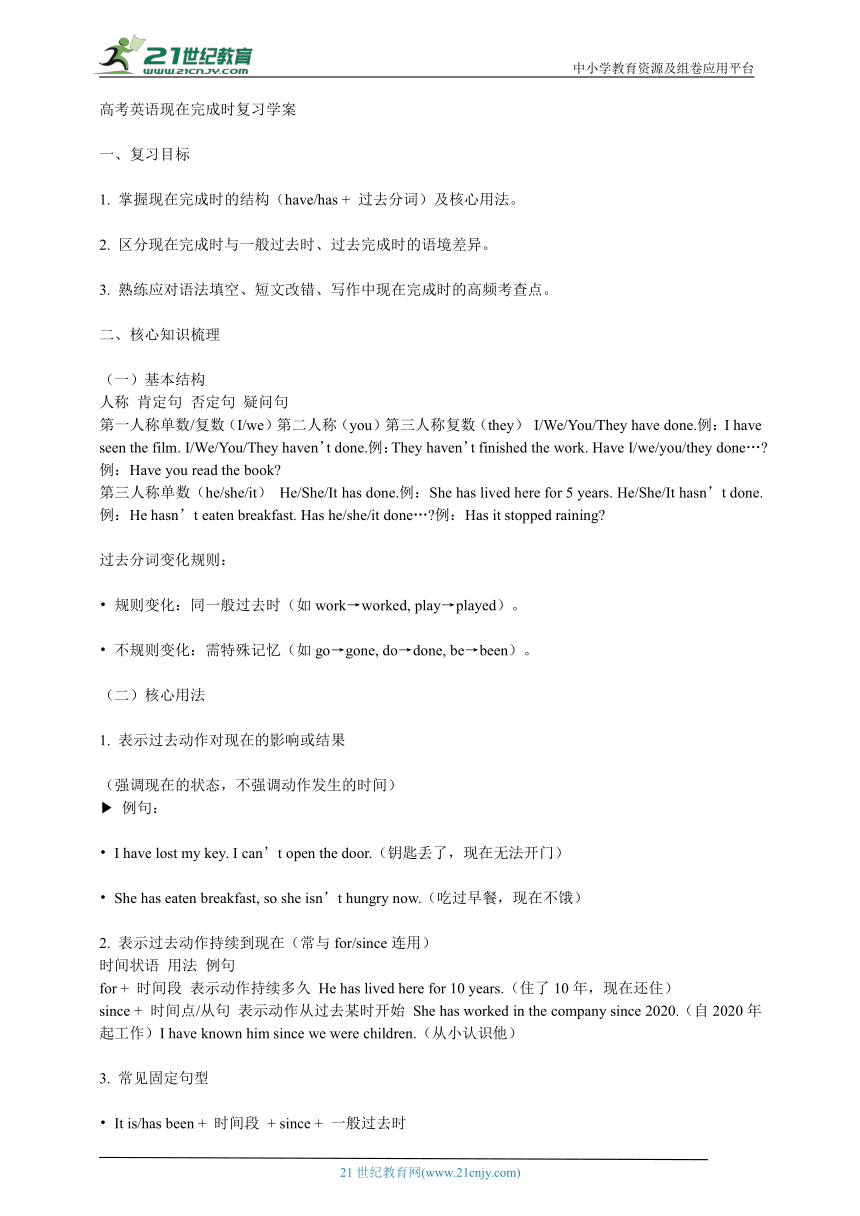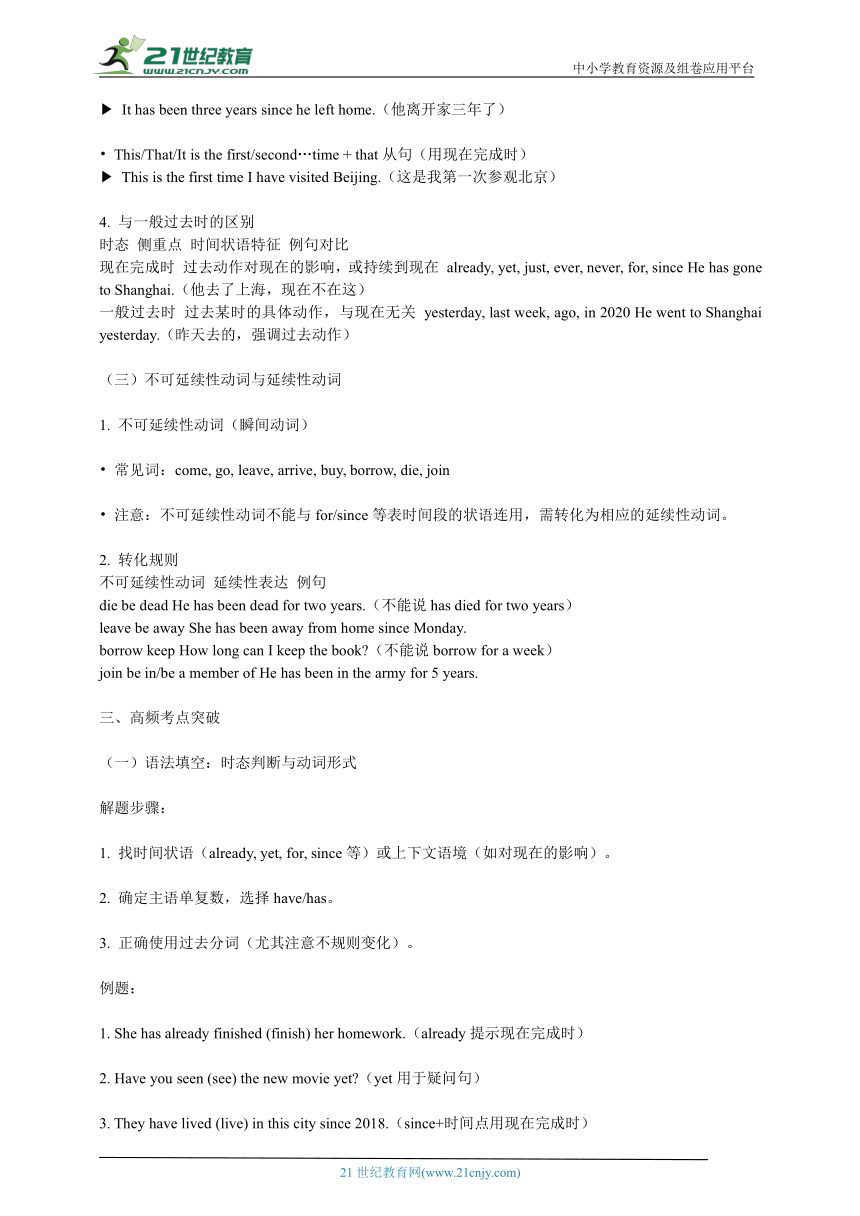高考英语语法复习学案(现在完成时)
图片预览


文档简介
中小学教育资源及组卷应用平台
高考英语现在完成时复习学案
一、复习目标
1. 掌握现在完成时的结构(have/has + 过去分词)及核心用法。
2. 区分现在完成时与一般过去时、过去完成时的语境差异。
3. 熟练应对语法填空、短文改错、写作中现在完成时的高频考查点。
二、核心知识梳理
(一)基本结构
人称 肯定句 否定句 疑问句
第一人称单数/复数(I/we)第二人称(you)第三人称复数(they) I/We/You/They have done.例:I have seen the film. I/We/You/They haven’t done.例:They haven’t finished the work. Have I/we/you/they done… 例:Have you read the book
第三人称单数(he/she/it) He/She/It has done.例:She has lived here for 5 years. He/She/It hasn’t done.例:He hasn’t eaten breakfast. Has he/she/it done… 例:Has it stopped raining
过去分词变化规则:
规则变化:同一般过去时(如work→worked, play→played)。
不规则变化:需特殊记忆(如go→gone, do→done, be→been)。
(二)核心用法
1. 表示过去动作对现在的影响或结果
(强调现在的状态,不强调动作发生的时间)
例句:
I have lost my key. I can’t open the door.(钥匙丢了,现在无法开门)
She has eaten breakfast, so she isn’t hungry now.(吃过早餐,现在不饿)
2. 表示过去动作持续到现在(常与for/since连用)
时间状语 用法 例句
for + 时间段 表示动作持续多久 He has lived here for 10 years.(住了10年,现在还住)
since + 时间点/从句 表示动作从过去某时开始 She has worked in the company since 2020.(自2020年起工作)I have known him since we were children.(从小认识他)
3. 常见固定句型
It is/has been + 时间段 + since + 一般过去时
It has been three years since he left home.(他离开家三年了)
This/That/It is the first/second…time + that从句(用现在完成时)
This is the first time I have visited Beijing.(这是我第一次参观北京)
4. 与一般过去时的区别
时态 侧重点 时间状语特征 例句对比
现在完成时 过去动作对现在的影响,或持续到现在 already, yet, just, ever, never, for, since He has gone to Shanghai.(他去了上海,现在不在这)
一般过去时 过去某时的具体动作,与现在无关 yesterday, last week, ago, in 2020 He went to Shanghai yesterday.(昨天去的,强调过去动作)
(三)不可延续性动词与延续性动词
1. 不可延续性动词(瞬间动词)
常见词:come, go, leave, arrive, buy, borrow, die, join
注意:不可延续性动词不能与for/since等表时间段的状语连用,需转化为相应的延续性动词。
2. 转化规则
不可延续性动词 延续性表达 例句
die be dead He has been dead for two years.(不能说has died for two years)
leave be away She has been away from home since Monday.
borrow keep How long can I keep the book (不能说borrow for a week)
join be in/be a member of He has been in the army for 5 years.
三、高频考点突破
(一)语法填空:时态判断与动词形式
解题步骤:
1. 找时间状语(already, yet, for, since等)或上下文语境(如对现在的影响)。
2. 确定主语单复数,选择have/has。
3. 正确使用过去分词(尤其注意不规则变化)。
例题:
1. She has already finished (finish) her homework.(already提示现在完成时)
2. Have you seen (see) the new movie yet (yet用于疑问句)
3. They have lived (live) in this city since 2018.(since+时间点用现在完成时)
(二)短文改错:时态误用与动词形式错误
常见错误类型:
1. 与一般过去时混淆:
错:I saw the film, so I know the ending.
对:I have seen the film, so I know the ending.(强调对现在的影响)
2. 不可延续性动词与时间段连用:
错:He has died for three years.
对:He has been dead for three years.(用延续性表达)
3. 过去分词错误:
错:She has went to school.
对:She has gone to school.(go的过去分词为gone)
例题:
错:I have borrowed the book for two weeks.
改:I have kept the book for two weeks.(borrow→keep)
(三)写作:现在完成时的精准应用
提升技巧:
1. 用“现在完成时+already/yet”强调动作完成情况:
原句:I finish my project.
改:I have already finished my project.(突出已完成)
2. 避免中文思维导致的时态冗余:
正确:我已经看过这部电影了。→ I have seen the movie.(无需加“了”字对应的过去式)
3. 区分“have been to”与“have gone to”:
have been to:去过某地(已返回)
She has been to Beijing twice.(她去过北京两次)
have gone to:去了某地(未返回)
He has gone to Beijing. He will be back next week.(他去了北京,下周回)
(四)经典句型应用
This is the best/worst… I have ever done
This is the most interesting book I have ever read.(这是我读过最有趣的书)
What have you done so far
So far, we have learned 2000 English words.(到目前为止,我们学了2000个单词)
四、巩固练习
(一)单句填空
1. He ______ (not come) back yet.
2. They ______ (live) in London since 2019.
3. ______ you ______ (see) the famous singer before
4. This is the second time I ______ (be) here.
5. The film ______ (start), so we can’t enter now.
(二)短文改错(每行一处错误)
1. I have bought the car for three years. __________
2. She has went to the library. __________
3. Have you ever been in Paris __________
4. We have finished the work yesterday. __________
5. He has joined the club since last month. __________
(三)写作提升
用现在完成时完成句子:
1. 我已经学英语十年了。
I ____________________ English for ten years.
2. 他刚离开,你错过了他。
He ____________________ just now. You missed him.
3. 这是我看过最精彩的比赛。
This is the most wonderful match I ____________________.
五、参考答案(独立完成后核对)
(一)单句填空
1. hasn’t come
2. have lived
3. Have; seen
4. have been
5. has started
(二)短文改错
1. bought→had(buy为不可延续性动词,改为have)
2. went→gone(go的过去分词为gone)
3. in→to(have been to表示“去过”)
4. 去掉have(yesterday用一般过去时)
5. joined→been in(join为不可延续性动词,改为be in)
(三)写作提升
1. have learned
2. has left
3. have ever seen
备考小贴士:
1. 制作“不规则动词过去分词表”,每日默写高频词(如do→done, see→seen, write→written)。
2. 针对for/since的句型,用“时间段数轴”辅助理解动作的持续性。
3. 写作中优先使用“现在完成时+一般过去时”结构,清晰区分动作的先后关系(如:I have finished the task that I received yesterday.)。
21世纪教育网 www.21cnjy.com 精品试卷·第 2 页 (共 2 页)
HYPERLINK "http://21世纪教育网(www.21cnjy.com)
" 21世纪教育网(www.21cnjy.com)
高考英语现在完成时复习学案
一、复习目标
1. 掌握现在完成时的结构(have/has + 过去分词)及核心用法。
2. 区分现在完成时与一般过去时、过去完成时的语境差异。
3. 熟练应对语法填空、短文改错、写作中现在完成时的高频考查点。
二、核心知识梳理
(一)基本结构
人称 肯定句 否定句 疑问句
第一人称单数/复数(I/we)第二人称(you)第三人称复数(they) I/We/You/They have done.例:I have seen the film. I/We/You/They haven’t done.例:They haven’t finished the work. Have I/we/you/they done… 例:Have you read the book
第三人称单数(he/she/it) He/She/It has done.例:She has lived here for 5 years. He/She/It hasn’t done.例:He hasn’t eaten breakfast. Has he/she/it done… 例:Has it stopped raining
过去分词变化规则:
规则变化:同一般过去时(如work→worked, play→played)。
不规则变化:需特殊记忆(如go→gone, do→done, be→been)。
(二)核心用法
1. 表示过去动作对现在的影响或结果
(强调现在的状态,不强调动作发生的时间)
例句:
I have lost my key. I can’t open the door.(钥匙丢了,现在无法开门)
She has eaten breakfast, so she isn’t hungry now.(吃过早餐,现在不饿)
2. 表示过去动作持续到现在(常与for/since连用)
时间状语 用法 例句
for + 时间段 表示动作持续多久 He has lived here for 10 years.(住了10年,现在还住)
since + 时间点/从句 表示动作从过去某时开始 She has worked in the company since 2020.(自2020年起工作)I have known him since we were children.(从小认识他)
3. 常见固定句型
It is/has been + 时间段 + since + 一般过去时
It has been three years since he left home.(他离开家三年了)
This/That/It is the first/second…time + that从句(用现在完成时)
This is the first time I have visited Beijing.(这是我第一次参观北京)
4. 与一般过去时的区别
时态 侧重点 时间状语特征 例句对比
现在完成时 过去动作对现在的影响,或持续到现在 already, yet, just, ever, never, for, since He has gone to Shanghai.(他去了上海,现在不在这)
一般过去时 过去某时的具体动作,与现在无关 yesterday, last week, ago, in 2020 He went to Shanghai yesterday.(昨天去的,强调过去动作)
(三)不可延续性动词与延续性动词
1. 不可延续性动词(瞬间动词)
常见词:come, go, leave, arrive, buy, borrow, die, join
注意:不可延续性动词不能与for/since等表时间段的状语连用,需转化为相应的延续性动词。
2. 转化规则
不可延续性动词 延续性表达 例句
die be dead He has been dead for two years.(不能说has died for two years)
leave be away She has been away from home since Monday.
borrow keep How long can I keep the book (不能说borrow for a week)
join be in/be a member of He has been in the army for 5 years.
三、高频考点突破
(一)语法填空:时态判断与动词形式
解题步骤:
1. 找时间状语(already, yet, for, since等)或上下文语境(如对现在的影响)。
2. 确定主语单复数,选择have/has。
3. 正确使用过去分词(尤其注意不规则变化)。
例题:
1. She has already finished (finish) her homework.(already提示现在完成时)
2. Have you seen (see) the new movie yet (yet用于疑问句)
3. They have lived (live) in this city since 2018.(since+时间点用现在完成时)
(二)短文改错:时态误用与动词形式错误
常见错误类型:
1. 与一般过去时混淆:
错:I saw the film, so I know the ending.
对:I have seen the film, so I know the ending.(强调对现在的影响)
2. 不可延续性动词与时间段连用:
错:He has died for three years.
对:He has been dead for three years.(用延续性表达)
3. 过去分词错误:
错:She has went to school.
对:She has gone to school.(go的过去分词为gone)
例题:
错:I have borrowed the book for two weeks.
改:I have kept the book for two weeks.(borrow→keep)
(三)写作:现在完成时的精准应用
提升技巧:
1. 用“现在完成时+already/yet”强调动作完成情况:
原句:I finish my project.
改:I have already finished my project.(突出已完成)
2. 避免中文思维导致的时态冗余:
正确:我已经看过这部电影了。→ I have seen the movie.(无需加“了”字对应的过去式)
3. 区分“have been to”与“have gone to”:
have been to:去过某地(已返回)
She has been to Beijing twice.(她去过北京两次)
have gone to:去了某地(未返回)
He has gone to Beijing. He will be back next week.(他去了北京,下周回)
(四)经典句型应用
This is the best/worst… I have ever done
This is the most interesting book I have ever read.(这是我读过最有趣的书)
What have you done so far
So far, we have learned 2000 English words.(到目前为止,我们学了2000个单词)
四、巩固练习
(一)单句填空
1. He ______ (not come) back yet.
2. They ______ (live) in London since 2019.
3. ______ you ______ (see) the famous singer before
4. This is the second time I ______ (be) here.
5. The film ______ (start), so we can’t enter now.
(二)短文改错(每行一处错误)
1. I have bought the car for three years. __________
2. She has went to the library. __________
3. Have you ever been in Paris __________
4. We have finished the work yesterday. __________
5. He has joined the club since last month. __________
(三)写作提升
用现在完成时完成句子:
1. 我已经学英语十年了。
I ____________________ English for ten years.
2. 他刚离开,你错过了他。
He ____________________ just now. You missed him.
3. 这是我看过最精彩的比赛。
This is the most wonderful match I ____________________.
五、参考答案(独立完成后核对)
(一)单句填空
1. hasn’t come
2. have lived
3. Have; seen
4. have been
5. has started
(二)短文改错
1. bought→had(buy为不可延续性动词,改为have)
2. went→gone(go的过去分词为gone)
3. in→to(have been to表示“去过”)
4. 去掉have(yesterday用一般过去时)
5. joined→been in(join为不可延续性动词,改为be in)
(三)写作提升
1. have learned
2. has left
3. have ever seen
备考小贴士:
1. 制作“不规则动词过去分词表”,每日默写高频词(如do→done, see→seen, write→written)。
2. 针对for/since的句型,用“时间段数轴”辅助理解动作的持续性。
3. 写作中优先使用“现在完成时+一般过去时”结构,清晰区分动作的先后关系(如:I have finished the task that I received yesterday.)。
21世纪教育网 www.21cnjy.com 精品试卷·第 2 页 (共 2 页)
HYPERLINK "http://21世纪教育网(www.21cnjy.com)
" 21世纪教育网(www.21cnjy.com)
